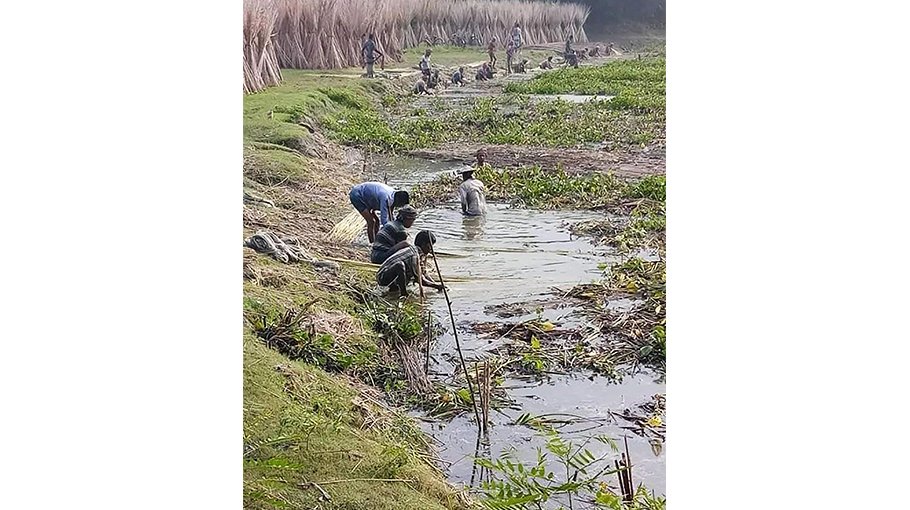Farmers busy separating jute fibre in Damurhuda

Farmers of different villages in Damurhuda upazila of Chuadanga district are passing busy time processing jute fibre during the rainy season.
They are now cutting jute plants and processing the jute fibre, including retting, removing fibre from plants and drying.
However, the farmers of the upazila are not happy with the prices of jute in the market. They will have to face losses if they sell jute at the current market price due to the cost incurred from sowing jute seeds to preparing fibre for sale.
Sources in Damurhuda Agriculture Office said the target of jute cultivation in the upazila has been set at 5,500 hectares of land this year while the crop has been cultivated on 3,270 hectares of land. However, jute was cultivated on 2,500 hectares of more land last year than this year.
Jute processing has started in some areas of Damurhuda and sales have already begun. Many farmers are preparing to sell jute. However, farmers are expressing their disappointment as the market price of jute is much lower than the production cost this year. Jute has started emerging in the market. In the current market, per maund of jute is being sold at the rate of Tk 1,800. However, if the colour of jute fibre is good, it is being sold up to Tk 2,200.
Local jute trader Ashraful said currently each maund of jute is being sold at Tk 2,000. According to the market, the price of jute may fall further. Md Jalal, a farmer of Kurulgachhi village in Damurhuda upazila, said if they sell jute fibre at the current market price, they cannot get back the production cost. “Farmers like us will suffer if the market price falls. We cannot store the crop at home. We have to sell the crop immediately for money,” he said.
Abdur Rahman, another farmer of Barabaldia village under Parkrishnapur-Madna Union, said, “I have heard that the price of jute will decrease further in the future. If the price goes down, we have to count the loss.”
Samad Ali of Hudapara village under Karpasdanga Union said, “The yield of jute has been good. As the price is low in the market, there is a dilemma about selling. We don't even have a place to store it. Jute has to be sold to prepare the land for the next crop. But the wholesalers are buying jute to stock up at lower prices. They will sell when the price increases.”
In many places of the upazila, the farmers have started paddy cultivation after jute. The work of jute cutting and clearing of high land is in progress.
Damurhuda Upazila Agriculture Officer Sharmin Akhter said the weather of this upazila is quite suitable for jute cultivation. Due to this, every year jute yield is good here. “We provide all types of advice to farmers. The price of jute is slightly low in the market. If the price of jute increases, the farmers will benefit,” she said.
Bangladesh is a country of golden fibre. Once upon a time, jute was the main cash crop. Farmers are now reluctant to grow jute due to fall in jute prices.



